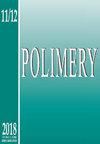Ink based on poly(3,4-ethylene dioxythiophene), poly(sulfonostyrene) and silver nanoparticles (PEDOT/PSS/SNP) blends for fabrics printing
IF 0.8
4区 工程技术
Q4 POLYMER SCIENCE
引用次数: 0
Abstract
The influence of co-solvents such as: dimethylsulfoxide (DMSO), isopropyl alcohol (IPA), ethylene glycol (EG), ethanol (EtOH) and deionized water (DI) on the properties of ink based on poly(3,4-ethylene dioxythiophene), poly(sulfonostyrene) and silver nanoparticles (PEDOT/PSS/SNP) blends was investigated. The ink was obtained by the ultrasonic dispersion method by mixing PEDOT, PSS and SNP and then adding co-solvents. The ink was applied to the cotton fabric by printing method. The structure, electrical and functional properties of fabrics were investigated. The increase in electrical conductivity was found as a result of the phase separation between PEDOT and PSS due to the use of co-solvents. SEM micrographs showed good adhesion of the ink to the cotton fiber, which was confirmed by the FTIR method. The developed ink has great application potential, especially in electronic devices for biomedical purposes.基于聚(3,4-亚乙基二氧噻吩)、聚(磺基萘)和银纳米颗粒(PEDOT/PSS/SNP)共混物的织物印刷油墨
研究了二甲基亚砜(DMSO)、异丙醇(IPA)、乙二醇(EG)、乙醇(EtOH)和去离子水(DI)等共溶剂对聚(3,4-亚乙基二氧噻吩)、聚(磺酰基苯乙烯)和银纳米粒子(PEDOT/PSS/SNP)共混物油墨性能的影响。通过将PEDOT、PSS和SNP混合,然后加入助溶剂,通过超声分散法获得油墨。油墨是用印刷法涂在棉布上的。研究了织物的结构、电学性能和功能性能。导电性的增加是由于使用共溶剂而导致PEDOT和PSS之间的相分离的结果。SEM显微照片显示油墨与棉纤维具有良好的粘附性,FTIR方法证实了这一点。所开发的油墨具有巨大的应用潜力,特别是在生物医学用途的电子设备中。
本文章由计算机程序翻译,如有差异,请以英文原文为准。
求助全文
约1分钟内获得全文
求助全文
来源期刊

Polimery
Materials Science-Polymers and Plastics
CiteScore
2.90
自引率
6.20%
发文量
35
审稿时长
1 months
期刊介绍:
The "Polimery" journal, of international circulation, is publishing peerreviewed scientific and technical research papers covering polymer science and technology in the field of polymers, rubbers, chemical fibres and paints. The range of topics covered are raw materials, polymer synthesis, processing and applications of polymers. Apart from scientific and technical research papers the monthly includes technical and commercial information such as reports from fairs and exhibitions as well as home, world and technical news.
“Polimery "- an international journal covering the following topics: polymers, rubber, chemical fibres and paints.
The Journal is addressed to scientists, managers and engineering staff of universities, Polish Academy of Sciences, R&D institutions, industry, specializing in polymer chemistry, physical chemistry, technology and processing. “Polimery” publishes original, reviewed research, scientific and technology papers in the field of polymer synthesis, analysis, technology and modification, processing, properties, applications and recycling.
 求助内容:
求助内容: 应助结果提醒方式:
应助结果提醒方式:


